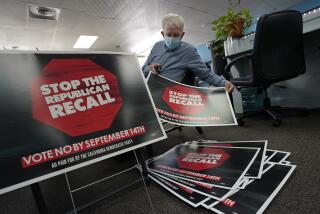Decision ’94 / SPECIAL GUIDE TO CALIFORNIA’S ELECTIONS : Propositions : 183: Lengthens Timing of Recall Elections : WHAT IT IS
The attempted recall of state Sen. David A. Roberti (D-Van Nuys) has prompted this proposal. It would change the number of days a governor has to place the recall election of a state officeholder on the ballot.
Under an obscure provision in the Constitution, the governor now must set an election within 60 to 80 days after a sufficient number of signatures have been gathered calling for the recall of an officeholder. Proposition 183, a constitutional amendment proposal authored by state Sen. Milton Marks (D-San Francisco), would allow the governor up to 180 days to order a vote on the recall if it can be consolidated with a regularly scheduled election.
In April, after the gun lobby and others organized a signature-gathering effort in retaliation for his legislation banning assault weapons, Roberti became the first state officeholder in 80 years to face a recall election. A majority of those who voted in the special election in his San Fernando Valley district voted to keep Roberti in office. Two months later, the senator lost a primary fight for state treasurer. He remains a senator but will leave office at the end of the year.
Until the Roberti vote in April, recall elections aimed at state officeholders had been held only three times in California history--twice in 1913 and once in 1914. Recall proposals in which proponents failed to gather enough signatures to reach the ballot have been attempted 107 times, 55 of those since 1986. In 1911, voters won the authority to recall an elected state official during a wave of reform spearheaded by Gov. Hiram Johnson that also gave them the power of initiative and referendum.
ARGUMENTS FOR
Even though the June primary was only two months away, Los Angeles County spent $1 million arranging for the separate Roberti recall election. If Proposition 183 had been in effect, the recall would have gone on the ballot along with other contests at a regular election time, sparing the extra expense. Consolidation of recall elections with forthcoming election dates would save time, effort and money.
Voting in a recall election would be more representative of the electorate’s wishes if held in conjunction with regularly scheduled elections where voter turnout is likely to be higher.
ARGUMENTS AGAINST
Proposition 183 is designed by legislators to protect themselves by delaying the recall process for up to six months, and it would deny voters the right to promptly remove an officeholder they dislike. The idea behind the recall power was to give voters the right to make an immediate change in the direction of government by removing and replacing unsatisfactory officials.
Proposition 183 could also result in a state official being recalled from office and reelected on the same ballot, a ridiculous situation.
WHO SUPPORTS IT
The League of Women Voters of California, Acting Secretary of State Tony Miller and state Sen. Milton Marks (D-San Francisco).
WHO OPPOSES IT
Assembly members David Knowles (R-Placerville), Mickey Conroy (R-Orange) and Dean Andal (R-Stockton).
More to Read
Get the L.A. Times Politics newsletter
Deeply reported insights into legislation, politics and policy from Sacramento, Washington and beyond. In your inbox three times per week.
You may occasionally receive promotional content from the Los Angeles Times.










